Appliquer des filtres
A real-time Twitter Chat promotes appropriate antibiotic use and stewardship in practice. Chats are open to all and run on the third Thursday of each month from 7-8 PM EST. Follow @ASP_chat for information.
A free, self-directed online course providing community-based practitioners with the latest evidence and treatment guidelines for use of antibiotics in primary care. Certified for 3.5 Mainpro+ credits.
This comprehensive guide to antimicrobial therapy and aid to wiser antibiotic use in front-line practice is available as a mobile app for both Android and iPhone.
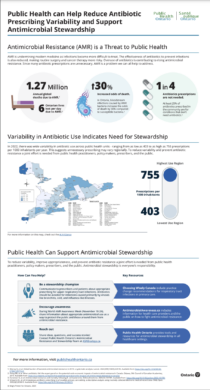
Infographics on strategies to reduce antibiotic overuse in primary care from Public Health Ontario.
Practical, evidence-based information on how to promote antimicrobial stewardship in a range of healthcare settings, from Public Health Ontario.
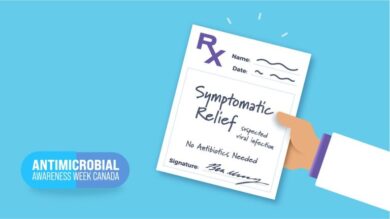
Un formulaire à remettre aux patients chez qui on suspecte une infection virale. Cet outil pédagogique, qui vous fera épargner du temps, fournit des conseils sur les moyens de soulager les symptômes et le moment qui convient pour une visite de suivi. Offert en deux versions, l’une pour adulte et l’autre pour enfant. Commandez-les gratuitement.
Help stop inappropriate antibiotic use for asymptomatic bacteriuria in long-term care residents and elderly patients in acute care. Download bilingual resources, freely available for use in your practice setting.
Pharmacy5in5 is an online learning platform designed by pharmacists, popular for its innovative digital tools. Registration is open to pharmacy professionals in Canada. Check out their short video on antibiotic prescribing and related infographic.
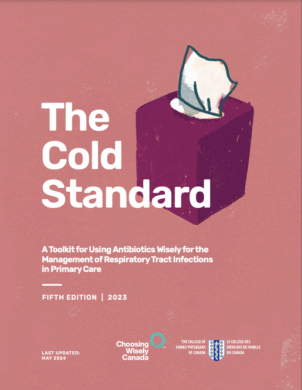
The fifth edition of Choosing Wisely Canada’s The Cold Standard toolkit has been released for managing respiratory tract infections in primary care. Includes multi-lingual posters.
Choisir avec soin Canada a formulé des recommandations quant aux pratiques à modifier en matière de soins primaires, de soins hospitaliers et de soins de longue durée. Les ressources à télécharger incluent des dépliants à l’intention des patients et des affiches pour salles d’attente. Une troisième édition de la trousse Bonnes pratiques : IVR et antibiotiques a été publiée. On y parle de la prise en charge des infections des voies respiratoires au temps de la COVID-19 et des soins virtuels.
The patient-led program of Healthcare Excellence Canada hosts a webpage in support of World Antimicrobial Awareness Week. Visit the webpage for patient stories and other resources developed specifically for patients and the public.

The microbiome is an important environment of trillions of organisms living on and within you. Watch this video to learn how antibiotics can disrupt this delicate ecosystem and what you can do to protect your microbiome.
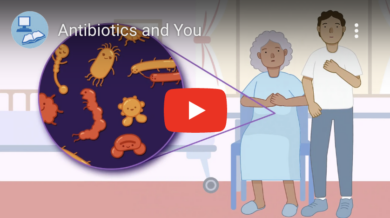
This video explains what antibiotics and the microbiome are, how they work, and the side-effects that you may experience. It also suggests questions to ask your healthcare providers when you have been prescribed an antibiotic.
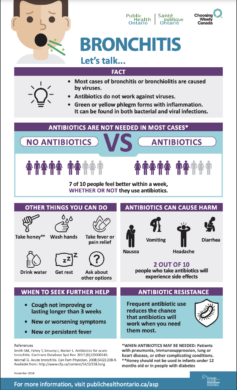
Infographic from Public Health Ontario about whether antibiotics are needed for bronchitis.
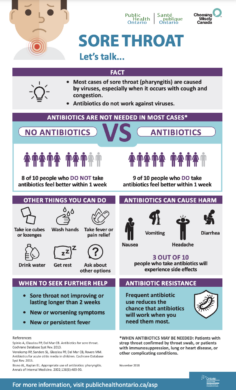
Infographic from Public Health Ontario about whether antibiotics are needed for a sore throat.
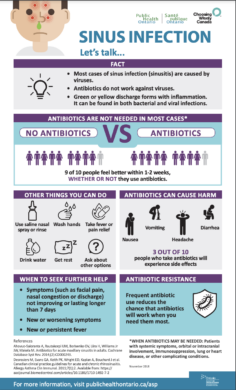
Infographic from Public Health Ontario about whether antibiotics are needed for sinus infections.
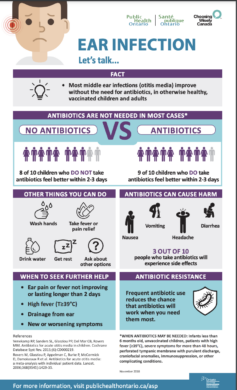
Infographic from Public Health Ontario about whether antibiotics are needed for ear infections.
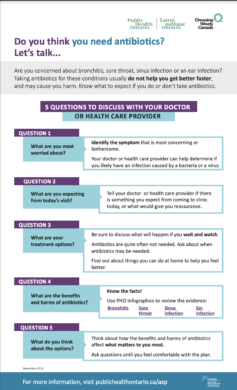
Infographic from Public Health Ontario provides guidance for patients on what to expect if you do or don’t take antibiotics.
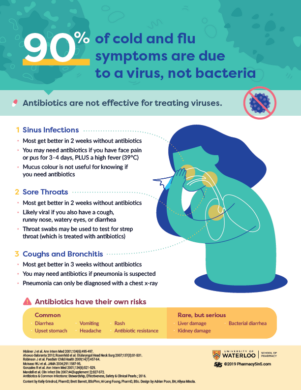
This handy infographic from the Pharmacy5in5 team at the University of Waterloo School of Pharmacy provides information on the appropriate use of antibiotics for common respiratory tract infections.

This short video for patients explores when you may not need antibiotics for upper respiratory tract infections and what you can do to feel better without antibiotics.
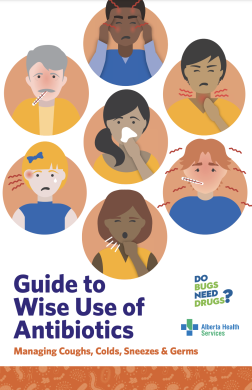
Le présent guide, réalisé par le programme Do Bugs Need Drugs de Services de Santé Alberta, vous aide à en apprendre plus sur un usage judicieux des antibiotiques pour votre famille. Découvrez les symptômes qui nécessitent des soins médicaux et la meilleure façon d’enrayer la propagation des infections. Proposé en plusieurs langues, dont quatre langues autochtones.
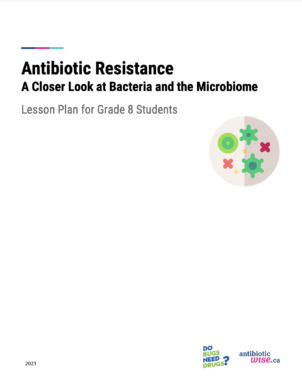
AntibioticWise offre des plans de cours pour aider les enseignants, les éducateurs de la petite enfance, les infirmiers et infirmières du réseau public et d’autres éducateurs à enseigner aux élèves les bases de la résistance aux antibiotiques, les germes et l’importance du lavage des mains.
AntibioticWise offre des vidéos et des réponses à vos questions sur les antibiotiques, leur consommation et l’antibiorésistance. Apprenez à connaître les situations où leur usage est conseillé ou déconseillé [en anglais seulement].
L’organisme central de santé publique au pays met à la disposition du public des informations sur la résistance aux antibiotiques (et aux antimicrobiens) : ses causes, ses risques pour la santé humaine et le bon usage des produits. Découvrez les mesures de surveillance et d’action adoptées par le Canada pour affronter un enjeu crucial pour la santé publique.